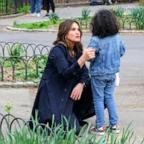Excerpt: 'The Lady and the Panda'
July 11, 2005 -- -- In "The Lady and the Panda: The True Adventures of the First American Explorer to Bring Back China's Most Exotic Animal," Vicki Croke traces Ruth Harkness' capture of the first giant panda brought to America.
After her husband died trying to bring a giant panda back from China in 1936, Harkness took up the cause herself. In so doing, she found herself up against ruthless competitors, thieves, warfare and a male-dominated world. But she had the help of Quentin Young, her Chinese guide and eventual lover.
Croke, the "Animal Beat" columnist for The Boston Globe, re-creates Harkness' journey into China's rugged wilderness and triumphant return to America, where she assumes her position among the zoological explorers.
It was a bitter winter night, February 19, 1936, and on the outskirts of Shanghai, far from the neon and the wailing jazz, thirty-four-year-old William Harvest Harkness, Jr., lay in a private hospital, blood-stiffened silk sutures tracking across his pale abdomen. He was dying, and alone in his agony. His original expedition mates, four adventurous men with dreams of capturing the giant panda, had all deserted him long before. Though he knew people in the city from previous trips and more recent escapades in notorious nightclubs and bars, in the end he had stayed true to some deeper nature, pushing them all away and stealing off in secret. His family, including his young wife back in Manhattan, had no idea he was even sick. With what little strength he could summon, he had been writing sunny notes home that masked his horrible condition. Perhaps he really believed his own words, for just weeks earlier he had been pressuring the doctor to release him so he could get back to his campaign. But, finally, on this frigid night, scarred by other attempts to scalpel tumors from his neck and torso and wretched from his latest incision, he found himself unable to eat or drink, then even to breathe. The sportsman who lived to rough it in the wild died under starched white sheets, in a ward reeking of antiseptic. His young life had ended in the pursuit of the most mysterious animal of his time, yet he had never managed to set a laced boot in the great snow-covered mountains that separated China and Tibet.
A world away, back in the noise and lights and rush of Manhattan, it had been an even chillier winter, one of the snowiest and coldest anyone could remember. Late in the afternoon, on the very day her husband took his last breath, Ruth Harkness was making her way home from a salon where she had enjoyed a luxurious shampoo. Bundled up, she happily picked her way along icy sidewalks that were dusted with ash for traction and walled in by freshly shoveled snow. Friends were due for cocktails shortly, and in the larger scheme of things, she had even more to look forward to. Now that things were beginning to go well for Bill, she thought, he might just be home within months. Then the two of them could travel the world as they had always imagined.
But as she stepped inside her comfortable West Side apartment, before she had time to hang up her coat, her "pretty little mulatto maid" and her houseguest, Margaret Freeland, confronted her with the horrible news: Bill was dead. A cable message had been relayed by telephone.
Her first reaction was stunned disbelief. It was too awful to accept. This must be some fantasy of the press -- reporters were fascinated by Bill and the other men of high adventure, but in their hunger for sensational stories, they were always getting things wrong. It had to be one of those false bulletins. Surely, over the course of the afternoon, that would become clear.




